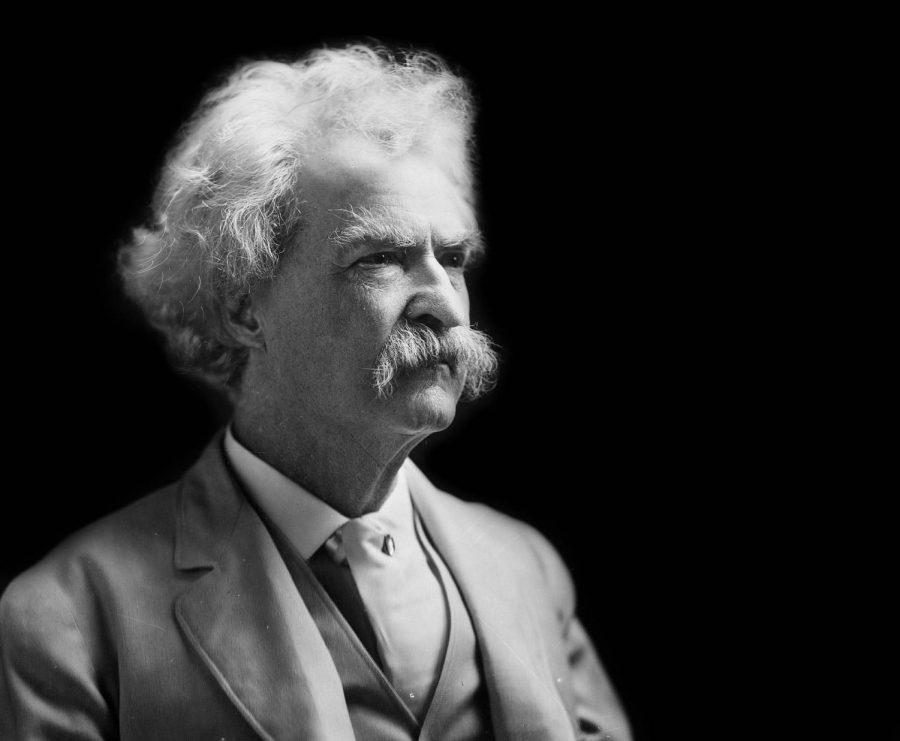The Rightful Canon Status of The Adventures of Huckleberry Finn
Mark Twain, author of The Adventures of Huckleberry Finn
April 30, 2021
Mark Twain’s The Adventures of Huckleberry Finn is, put lightly, a controversial book. Some believe it deserves a place among the greatest literature in American history while others feel it is too brutally honest to be in even a high school library. But that brutal honesty is what gives the novel its power in the first place. The argument against it is the very reason The Adventures of Huckleberry Finn deserves a place among the canon of American literature.
A large qualifying factor of canon status is that a book represents a moment in American society, and The Adventures of Huckleberry Finn does this rather bluntly for the frequently sugar-coated but shameful aspects of the American South in the mid-nineteenth century. Huck’s character development is primarily catalyzed by him becoming more separated from mainstream society, both physically and morally, this culminating when Jim is captured and Huck decides to help him despite believing he would go to Hell for it. He finally decides what is morally correct for himself, instead of listening to what is commonly believed. Twain simultaneously shows how powerful the prejudices of the time were—by how hard it is for Huck to have made this decision even after all the time he has spent with Jim—while also showing that it is possible to break out of the normative social influence—by the fact that, in the end, he decides to save Jim anyway.
Books in American canon are known to not only reflect on a moment in history, but also the attitudes of people in that time. Twain explores a rather pessimistic view of human nature in various characters and their development—or lack thereof. He frequently makes commentary on the psychology of a group in this time period, doing this multiple times over the course of the book, the Grangerford and Shepardson feud caused by a disagreement no one can remember, the King and the Duke’s apathy for everyone they scam, and most egregiously, the entire ending in which Tom turns Jim’s life and potential freedom into nothing more than a game. This level of consideration of human nature, particularly of how it is affected by groups, makes Twain’s novel far more than a children’s bedtime story, it makes it a revealing and vital part of the American canon.
A book in a canon must not only make a social commentary, but also ensure that it actually is received and absorbed. In The Adventures of Huckleberry Finn, one of Twain’s goals is to convince his white audience of the evils of slavery. He cleverly does this by making the narrator someone they can identify with, a white boy, and having him come to this realization himself. White society at the time of the book’s release would likely have been less receptive to a slave narrating the story, as most of them would see no way to relate to that character. Twain’s awareness of this further supports the novel’s canon status, as it does not just describe the evils of a society to those who already know of them and are suffering, but also provides a path for the privileged and unaware to see the truth of these evils too.
Whether The Adventures of Huckleberry Finn should be considered American canon has been debated for years and will likely continue to be for many more. Too often are people unwilling to allow for a book that forces them to acknowledge America’s bloody history and makes them uncomfortable—but discomfort is exactly what Twain intended. He wanted his Post-Civil War, Early-Jim-Crow era audience to, like Huckleberry, be made uncomfortable in hopes that it would then force them to open their minds. Not only does Twain’s novel, as polarizing as it may be, deserve a place among American canon, but also needs one.






